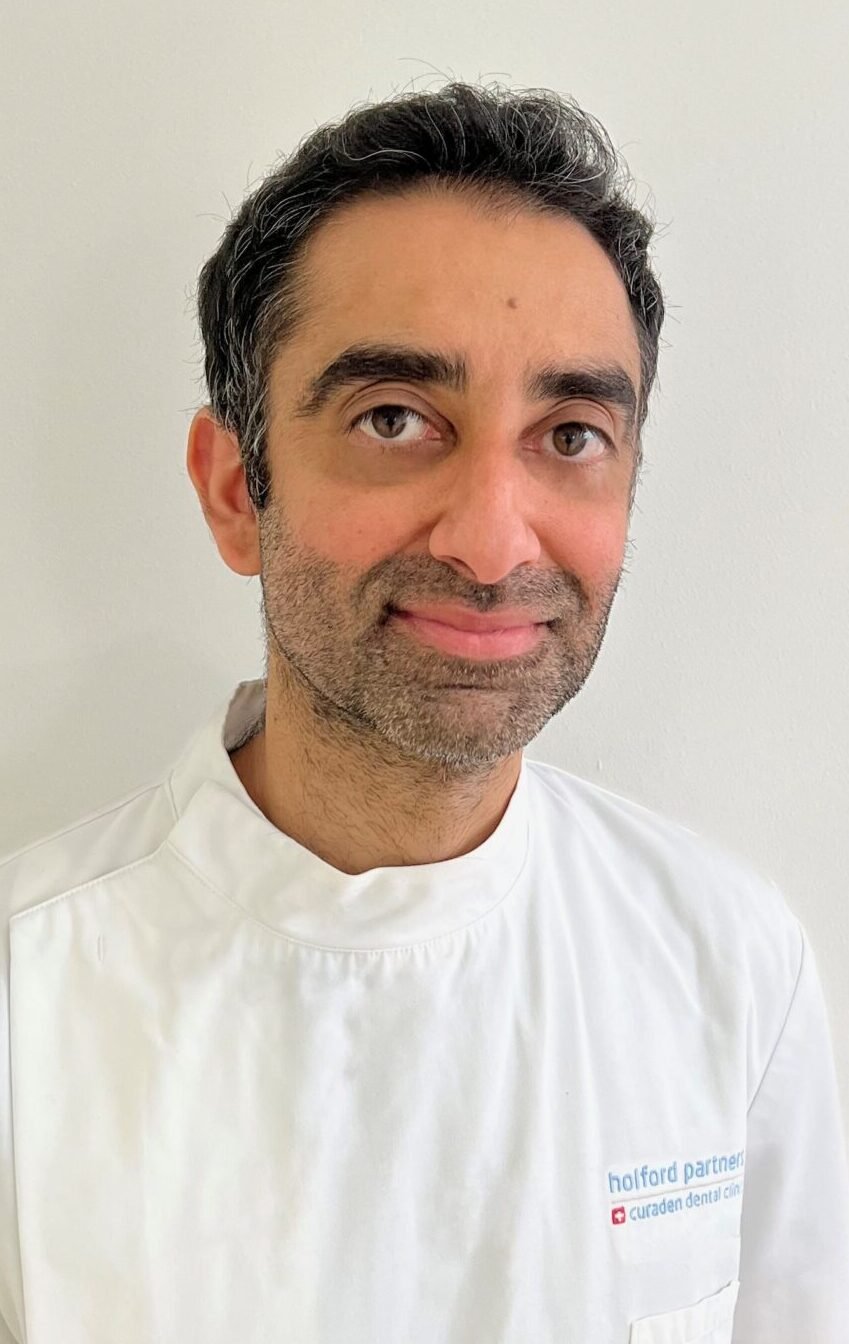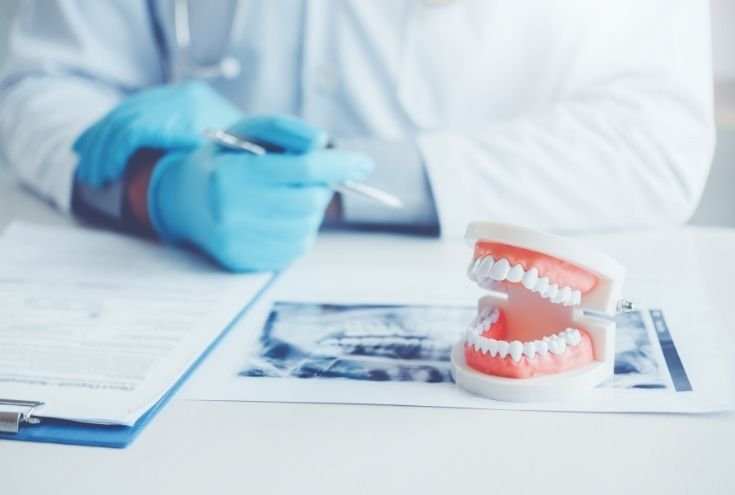
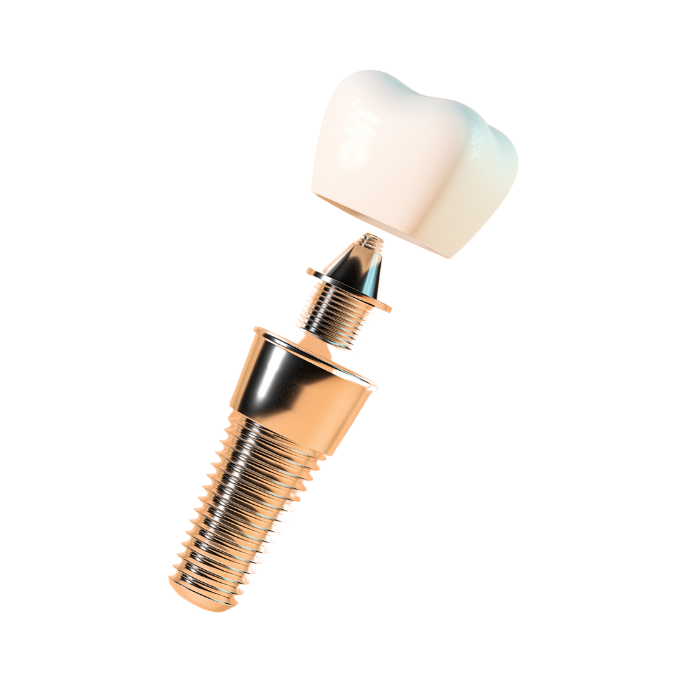
Dental Implants
The best way to replace missing teeth is to get dental implants where a replacement like a crown, bridge, or denture (full/partial, or permanent/removable) can be fitted.
A dental implant is a surgical prosthesis that discretely replaces a missing or failing tooth. If you have a gap in your smile where a tooth used to be then you may feel self conscious about it and lack the confidence to smile. It may even impact the way you speak or eat if you have multiple missing teeth.
Dental Implants
The best way to replace missing teeth is to get dental implants where a replacement like a crown, bridge, or denture (full/partial, or permanent/removable) can be fitted.
A dental implant is a surgical prosthesis that discretely replaces a missing or failing tooth. If you have a gap in your smile where a tooth used to be then you may feel self conscious about it and lack the confidence to smile. It may even impact the way you speak or eat if you have multiple missing teeth.

What are dental implants?
A dental implant is a screw that can be made of a variety of materials, such as titanium or ceramic that is surgically placed into your jawbone to replace a single or multiple teeth roots.
Once your implant has been fitted, the surrounding bone (and if required, bone graft materials) will begin to fuse to the implant, over the course of 3 months, firmly supporting it in place.
After this period of time, a restoration such as a dental implant crown, implant-supported bridge or implant-retained denture is fitted to the implant.
The restorations will match your natural teeth’s size, shape and shade, which will allow them to discretely blend in with your smile and go undetected as a false tooth or teeth.
What does a dental implant involve?
The treatment involves oral surgery and takes place in a few stages over a period of a several months, usually under local anaesthetic. First, the bone of the jaw will be exposed, a hole will be drilled, and the implant will be carefully inserted into the bone. Then, the gums will be sewn back together to cover the implant.
The most effective and widely used implant is made of titanium or the metal alloyed with another. Titanium naturally fuses to the bone, making it the best material to use for implants.
Ceramic implants are an option, but they do not work as well as titanium.
The titanium implant will fuse with the bone, which is known as osseointegration, and your surgical wounds will completely heal within a couple of weeks. The crown, bridge or denture that will replace the missing tooth or teeth will be fitted around 3 months later. You can get a temporary tooth replacement while you are healing in the form of a partial or full denture (depending on how many teeth are missing).
You can get dental implants around 2-3 months after an extraction, once the area has completely healed before undergoing further oral surgery to have the dental implant placed.
In general, people who have missing teeth will feel self-conscious when smiling and some may not even smile at all. People choose to have dental implants because they are a discrete and long lasting treatment to replace lost or missing teeth. In doing so this will allow patients to gain their confidence back when smiling and help improve your speech or the way you can eat.
The benefits include:
Long-lasting and fixed – Dental implants, if properly looked after, may last as long as you natural teeth. As they are surgically placed into your jawbone, you will not need to worry about having to remove them like other treatments such as dentures.
Restore function – Dental implants will enable you to enjoy the foods you were not able to have before with missing teeth. Dental implants can also help improve your speech.
Discreet – The restorations fitted to your dental implants (crown, bridge or denture) will be matched to your natural teeth’s colour, shape and size so they blend in undetected.
Stop bone loss – If gaps are left in the mouth where your teeth once were, then that area over time will begin to lose bone. By having a dental implant, the replacement tooth will function like a natural tooth which stimulates the jaw and prevents bone loss.
If you have recovered from an extraction, have a missing tooth or multiple teeth and are eligible for an implant, we will give you all the options available to replace what you have lost.
Dental implants can be used in combination with crowns, brides and dentures. Depending on what needs replacing will determine what type of treatment you will require.
Implants can be a simple to complex procedure depending on the pre-surgical requirements and the number of surgeries involved. The number of teeth you need replacing will also play a significant role in determining the cost, complexity, and length of procedures.
Each implant takes 1-2 hours to complete, and we can assure you that the entire implant surgery will be painless.
We have a great success rate in placing dental implants, where very few fail and this is mostly dependent on your compliance in following your dentist’s instructions for aftercare. We will provide prescriptions if necessary to continue your comfort.
In general, you can get your replacement teeth from start to finish in as little as six months, allowing you to get on with your life with a major boost in confidence and a smile you can be proud of.
Single Implants
After a single dental implant you will have the final crown fitted around 3 months later to replace the missing tooth. Our crowns are hand made by our skilled and experienced technicians using the highest quality materials to match your existing teeth. They can be made of E-max, zirconia or ceramic to provide a durable and beautiful solution.
An implant abutment is used to connect the implant screw to the crown.
A crown is then attached to the implant to replace the missing tooth. If you have more than one missing tooth then multiple dental implants can be placed to replace your lost teeth.
Multiple Implants
An implant-supported bridge, is a row of crowns that are linked together, and can either be attached to two or more implants or just one implant and one of your own natural teeth.
Fixed bridges usually require at least two implants and will take between 3-6 months to complete, taking into consideration the healing period.
Multiple dental implants are used when several teeth are missing from the same area in the mouth. Our experienced dentists will give you all the options available to provide you with treatment that fits your needs and budget.
We will help you make well-informed decisions with your health and wellness in mind.
Implant-supported bridges are used when multiple teeth in a row are missing, lost or failing. They are an alternative to traditional bridges that usually use neighbouring teeth to hold them in place.
Dental bridges usually have a replacement tooth or teeth with crowns either side to anchor the bridge and fill the gap using the adjacent teeth. In doing so, your dentist will need to prepare the teeth on either side of the gap, which requires the removal of healthy tooth structure. When you lose a tooth bone loss is a common aftereffect and traditional bridges don’t prevent bone loss as well as dental implants.
The dental implants that will hold the implant-supported bridge are surgically placed into the jaw. Your bone will then, over the next 3 months, fuse to the implants to great a solid foundation for the abutment posts to be attached. After the 3 month healing period, the permanent implant-supported bridge can be made and fitted to the now fully secure dental implants.
The length of treatment varies from patient to patient however it can take between three to six months from start to finish. It can sometimes be done in just 3 months if the implants can be placed at the same time as the teeth extractions. If you have missing teeth and require bone graft materials then the treatment may take a bit longer.
Full implant-retained dentures are attached to dental implants to replace a full arch of missing or lost teeth.
All-on-4 or all-on-6 dental implants
The method is usually known as the “all-on” procedure, and can be all-on-4 or all-on-6 dental implants. The obvious difference is the number of implants placed into the jawbone. If teeth are lost or missing then over time the jawbones will begin to deteriorate. Your teeth serve a very important purpose by maintaining bone levels and stabilising the jaw. By having dental implants surgically placed into the mouth, this will help to strengthen and stabilise the jawbone. Each implant will help to reinforce and stimulate the bone it has been implanted into.
Implant -retainer dentures are acrylic based and they are fitted with a metal bar which clips to your dental implants. This allows you to still take the denture in and out for cleaning purposes, but guarantees that the denture will be more secure than a standard denture because they are anchored by dental implants. This means you can laugh, smile and eat with more confidence as the risk of them moving around or falling out is very unlikely.
The length of treatment can range from 3 to 6 months but will vary from patient to patient. The dental implants will be surgically placed under local anaesthetic and allowed to heal and fuse with the bone for the next 3 months. You will have a temporary denture during this time so you won’t leave after your procedure without any teeth. Once healed we will see you again to take either a 3D digital scan or impressions to submit to our technicians to make your bespoke made implant-retained denture that will be fitted 2 weeks later.
Sometimes it can be possible to have an implant placed immediately after an extraction to save having 2 separate visits.
If you plan to get an implant, it is recommended that you do so at most three to six months before you experience bone loss.
The moment you lose your tooth, your bone will begin to deteriorate within three to six months. Bone loss before implants will require bone grafting where your dentist will have to graft your bone with human, cow, or pig bone so as to allow an implant to be placed – narrow, thin or weak bone implies no surface to place the implant. If bone loss is significant then a sinus lift/graft would allow for a foundation to place an implant 3 months later.
If you are losing or have lost your teeth, it would be best to act now when considering an excellent replacement.
SPECIALIST ORAL SURGURY – Exclusively with Dr Andy Hawkesford
What is a sinus lift?
A sinus lift, which is also known as a sinus augmentation, is a type of oral surgery where bone is added in the upper jaw above the roots of your premolars and molars to increase the height of the bone structure. The bone graft materials are added between the sinus membrane and the maxillary jaw bone. The sinuses are located either side of your nose. To allow for the bone graft materials to be placed, the sinus membrane needs to be carefully raised. A sinus lift requires specialist training and is done by our Specialist in Oral Surgery, Dr Andy Hawkesford.
Why do I need a Sinus Lift?
If you do not have enough bone in the upper jaw or your sinuses come too close to the jaw, then you won’t have enough bone to support dental implants. By adding more bone around the sinus area will add more depth to the upper jaw bone and increasing the distance of the sinus from the implant site.
There are several reasons why a sinus lift is necessary if you are considering dental implants:
– When patients loose their teeth especially their upper back teeth, because of the natural bone anatomy of the head, there is less bone at the back of the upper jaw than there is at the back of the lower jaw.
– Gum disease and periodontitis can cause minor to severe bone loss and if teeth are missing then the bone will begin to resorb if left as a gap. This bone loss then prevents the placement of dental implants.
– The sinuses may develop too close to the upper jaw, making it too shallow and impossible to place stable dental implants in the maxilla bone. The shape and size of the sinus differs from person to person and can even get larger as you get older.
Sinus lifts are becoming more and more common as dental implants are a great way of replacing missing teeth. Sinus grafts can sometimes be done on the same day as your dental implants, saving you from having 2 separate appointments and a longer waiting time to fit the restorations such as a crown, bridge or denture. You will need to wait around 3-4 months after your surgery to have the next stage of the dental implants (abutment and restoration).
How much do dental implants cost?
Treatment involving dental implants are usually composed of 3 parts: the dental implant, the implant abutment and the final restoration which can be an implant crown, bridge or denture. Prices may vary as sometimes extra bone graft materials are required to provide a good bone foundation for the implant placement. A more accurate estimate and treatment plan will provided after your initial consultation.
DENTAL IMPLANT (per tooth) ……………….. from £1500
IMPLANT ABUTMENT (per tooth) ……………….. from £800
IMPLANT CROWN (per tooth) ……………….. from £1240
IMPLANT BRIDGE (per tooth) ……………….. from £1240
IMPLANT DENTURE (per arch) ……………….. from £3500
Prices may be subject to change. For more information please feel free to contact us on 020 7499 9806 or at smile@holfordcuraden.com
BEFORE & AFTERS
In general, people who have missing teeth will feel self-conscious when smiling and some may not even smile at all. People choose to have dental implants because they are a discrete and long lasting treatment to replace lost or missing teeth. In doing so this will allow patients to gain their confidence back when smiling and help improve your speech or the way you can eat.
The benefits include:
Long-lasting and fixed – Dental implants, if properly looked after, may last as long as you natural teeth. As they are surgically placed into your jawbone, you will not need to worry about having to remove them like other treatments such as dentures.
Restore function – Dental implants will enable you to enjoy the foods you were not able to have before with missing teeth. Dental implants can also help improve your speech.
Discreet – The restorations fitted to your dental implants (crown, bridge or denture) will be matched to your natural teeth’s colour, shape and size so they blend in undetected.
Stop bone loss – If gaps are left in the mouth where your teeth once were, then that area over time will begin to lose bone. By having a dental implant, the replacement tooth will function like a natural tooth which stimulates the jaw and prevents bone loss.
In general, people who have missing teeth will feel self-conscious when smiling and some may not even smile at all. People choose to have dental implants because they are a discrete and long lasting treatment to replace lost or missing teeth. In doing so this will allow patients to gain their confidence back when smiling and help improve your speech or the way you can eat.
The benefits include:
Long-lasting and fixed – Dental implants, if properly looked after, may last as long as you natural teeth. As they are surgically placed into your jawbone, you will not need to worry about having to remove them like other treatments such as dentures.
Restore function – Dental implants will enable you to enjoy the foods you were not able to have before with missing teeth. Dental implants can also help improve your speech.
Discreet – The restorations fitted to your dental implants (crown, bridge or denture) will be matched to your natural teeth’s colour, shape and size so they blend in undetected.
Stop bone loss – If gaps are left in the mouth where your teeth once were, then that area over time will begin to lose bone. By having a dental implant, the replacement tooth will function like a natural tooth which stimulates the jaw and prevents bone loss.
If you have recovered from an extraction, have a missing tooth or multiple teeth and are eligible for an implant, we will give you all the options available to replace what you have lost.
Dental implants can be used in combination with crowns, brides and dentures. Depending on what needs replacing will determine what type of treatment you will require.
Implants can be a simple to complex procedure depending on the pre-surgical requirements and the number of surgeries involved. The number of teeth you need replacing will also play a significant role in determining the cost, complexity, and length of procedures.
Each implant takes 1-2 hours to complete, and we can assure you that the entire implant surgery will be painless.
We have a great success rate in placing dental implants, where very few fail and this is mostly dependent on your compliance in following your dentist’s instructions for aftercare. We will provide prescriptions if necessary to continue your comfort.
In general, you can get your replacement teeth from start to finish in as little as six months, allowing you to get on with your life with a major boost in confidence and a smile you can be proud of.
Single Implants
After a single dental implant you will have the final crown fitted around 3 months later to replace the missing tooth. Our crowns are hand made by our skilled and experienced technicians using the highest quality materials to match your existing teeth. They can be made of E-max, zirconia or ceramic to provide a durable and beautiful solution.
An implant abutment is used to connect the implant screw to the crown.
A crown is then attached to the implant to replace the missing tooth. If you have more than one missing tooth then multiple dental implants can be placed to replace your lost teeth.
Multiple Implants
An implant-supported bridge, is a row of crowns that are linked together, and can either be attached to two or more implants or just one implant and one of your own natural teeth.
Fixed bridges usually require at least two implants and will take between 3-6 months to complete, taking into consideration the healing period.
Multiple dental implants are used when several teeth are missing from the same area in the mouth. Our experienced dentists will give you all the options available to provide you with treatment that fits your needs and budget.
We will help you make well-informed decisions with your health and wellness in mind.
Implant-supported bridges are used when multiple teeth in a row are missing, lost or failing. They are an alternative to traditional bridges that usually use neighbouring teeth to hold them in place.
Dental bridges usually have a replacement tooth or teeth with crowns either side to anchor the bridge and fill the gap using the adjacent teeth. In doing so, your dentist will need to prepare the teeth on either side of the gap, which requires the removal of healthy tooth structure. When you lose a tooth bone loss is a common aftereffect and traditional bridges don’t prevent bone loss as well as dental implants.
The dental implants that will hold the implant-supported bridge are surgically placed into the jaw. Your bone will then, over the next 3 months, fuse to the implants to great a solid foundation for the abutment posts to be attached. After the 3 month healing period, the permanent implant-supported bridge can be made and fitted to the now fully secure dental implants.
The length of treatment varies from patient to patient however it can take between three to six months from start to finish. It can sometimes be done in just 3 months if the implants can be placed at the same time as the teeth extractions. If you have missing teeth and require bone graft materials then the treatment may take a bit longer.
Full implant-retained dentures are attached to dental implants to replace a full arch of missing or lost teeth.
All-on-4 or all-on-6 dental implants
The method is usually known as the “all-on” procedure, and can be all-on-4 or all-on-6 dental implants. The obvious difference is the number of implants placed into the jawbone. If teeth are lost or missing then over time the jawbones will begin to deteriorate. Your teeth serve a very important purpose by maintaining bone levels and stabilising the jaw. By having dental implants surgically placed into the mouth, this will help to strengthen and stabilise the jawbone. Each implant will help to reinforce and stimulate the bone it has been implanted into.
Implant -retainer dentures are acrylic based and they are fitted with a metal bar which clips to your dental implants. This allows you to still take the denture in and out for cleaning purposes, but guarantees that the denture will be more secure than a standard denture because they are anchored by dental implants. This means you can laugh, smile and eat with more confidence as the risk of them moving around or falling out is very unlikely.
The length of treatment can range from 3 to 6 months but will vary from patient to patient. The dental implants will be surgically placed under local anaesthetic and allowed to heal and fuse with the bone for the next 3 months. You will have a temporary denture during this time so you won’t leave after your procedure without any teeth. Once healed we will see you again to take either a 3D digital scan or impressions to submit to our technicians to make your bespoke made implant-retained denture that will be fitted 2 weeks later.
Sometimes it can be possible to have an implant placed immediately after an extraction to save having 2 separate visits.
If you plan to get an implant, it is recommended that you do so at most three to six months before you experience bone loss.
The moment you lose your tooth, your bone will begin to deteriorate within three to six months. Bone loss before implants will require bone grafting where your dentist will have to graft your bone with human, cow, or pig bone so as to allow an implant to be placed – narrow, thin or weak bone implies no surface to place the implant. If bone loss is significant then a sinus lift/graft would allow for a foundation to place an implant 3 months later.
If you are losing or have lost your teeth, it would be best to act now when considering an excellent replacement.
SPECIALIST ORAL SURGURY – Exclusively with Dr Andy Hawkesford
What is a sinus lift?
A sinus lift, which is also known as a sinus augmentation, is a type of oral surgery where bone is added in the upper jaw above the roots of your premolars and molars to increase the height of the bone structure. The bone graft materials are added between the sinus membrane and the maxillary jaw bone. The sinuses are located either side of your nose. To allow for the bone graft materials to be placed, the sinus membrane needs to be carefully raised. A sinus lift requires specialist training and is done by our Specialist in Oral Surgery, Dr Andy Hawkesford.
Why do I need a Sinus Lift?
If you do not have enough bone in the upper jaw or your sinuses come too close to the jaw, then you won’t have enough bone to support dental implants. By adding more bone around the sinus area will add more depth to the upper jaw bone and increasing the distance of the sinus from the implant site.
There are several reasons why a sinus lift is necessary if you are considering dental implants:
– When patients loose their teeth especially their upper back teeth, because of the natural bone anatomy of the head, there is less bone at the back of the upper jaw than there is at the back of the lower jaw.
– Gum disease and periodontitis can cause minor to severe bone loss and if teeth are missing then the bone will begin to resorb if left as a gap. This bone loss then prevents the placement of dental implants.
– The sinuses may develop too close to the upper jaw, making it too shallow and impossible to place stable dental implants in the maxilla bone. The shape and size of the sinus differs from person to person and can even get larger as you get older.
Sinus lifts are becoming more and more common as dental implants are a great way of replacing missing teeth. Sinus grafts can sometimes be done on the same day as your dental implants, saving you from having 2 separate appointments and a longer waiting time to fit the restorations such as a crown, bridge or denture. You will need to wait around 3-4 months after your surgery to have the next stage of the dental implants (abutment and restoration).
How much do dental implants cost?
Treatment involving dental implants are usually composed of 3 parts: the dental implant, the implant abutment and the final restoration which can be an implant crown, bridge or denture. Prices may vary as sometimes extra bone graft materials are required to provide a good bone foundation for the implant placement. A more accurate estimate and treatment plan will provided after your initial consultation.
DENTAL IMPLANT (per tooth) ……………….. from £1500
IMPLANT ABUTMENT (per tooth) ……………….. from £800
IMPLANT CROWN (per tooth) ……………….. from £1240
IMPLANT BRIDGE (per tooth) ……………….. from £1240
IMPLANT DENTURE (per arch) ……………….. from £3500
Prices may be subject to change. For more information please feel free to contact us on 020 7499 9806 or at smile@holfordcuraden.com
BEFORE & AFTERS
Who Offers Dental Implants?
Need New Teeth?
Implants are the best way for you to replace the precious teeth that you have lost. They give you no difficulty in eating or speaking, they look better, and they are a more stable alternative. If you want to get your smile back, book an appointment to see us now.

Top Quality Painless
Surgery
With dental implants, you can get crowns, bridges, or implant-supported dentures (permanent or detachable). At Holford Partners Curaden, you can get the best quality dental implants without pain or discomfort.
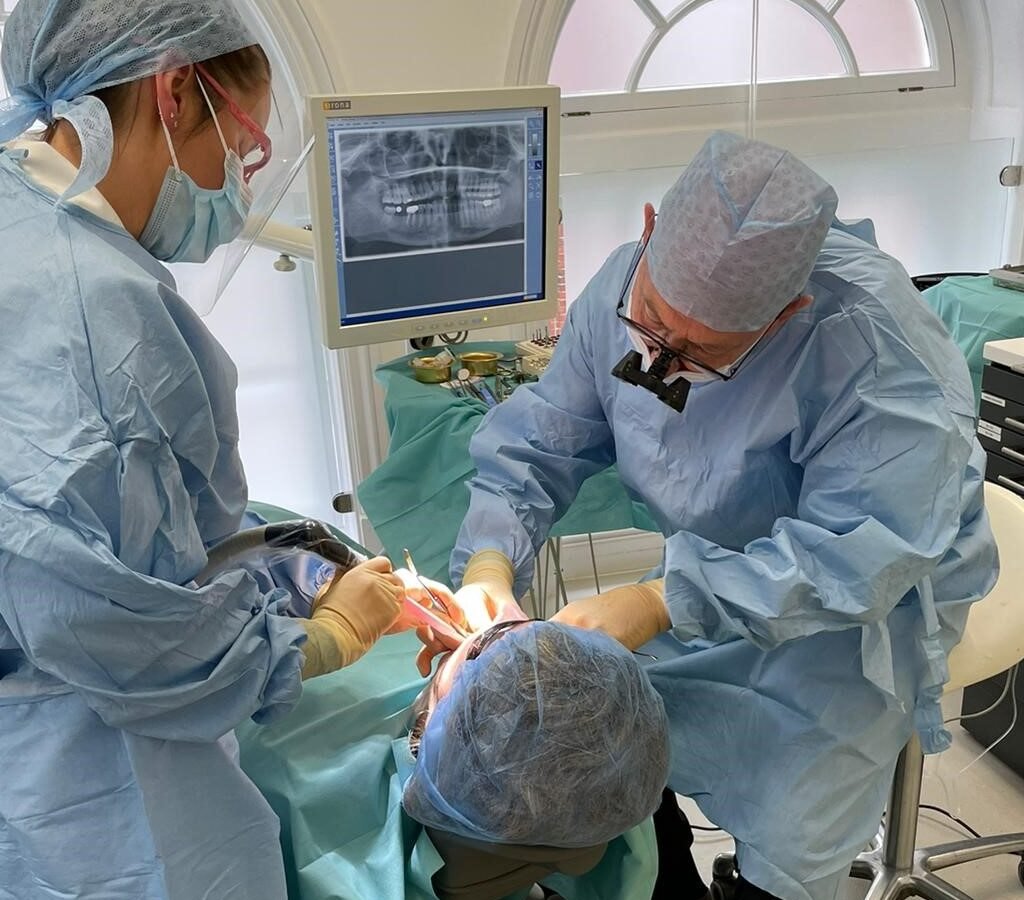

Top Quality Painless
Surgery
With dental implants, you can get crowns, bridges, or implant-supported dentures (permanent or detachable). At Holford Partners Curaden, you can get the best quality dental implants without pain or discomfort.

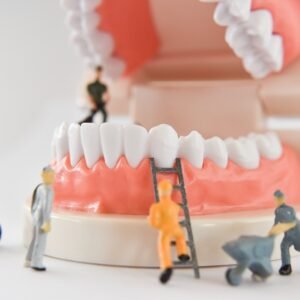
That is why having a check-up with the dentist is a must before deciding to have an implant.
When you come to Holford Partners Curaden, we will assess and advise you, using the latest technology.
We have the latest X-Rays and intra-oral scanners that can show you a clear image of your teeth and the current condition they are in. You will see exactly what’s going on.
We will determine whether an extraction or bone grafting will be necessary before implants and we’ll plan how many implants are required.
This way, our dentists can go through the different treatment options available to you and answer any questions you may have regarding a single tooth or multiple teeth replacements using dental implants.

Implants can be placed either immediately after an extraction (if the conditions are ideal and thoroughly planned prior to surgery) or they can be placed around 3 months after the extraction to allow the bone to heal. It is ideal to do the surgery as soon as you completely heal because you can suffer from bone loss if the gap is left without a permanent replacement.
Our experienced team can extract multiple teeth and place multiple implants using the latest technology and techniques. We can assure you that all procedures will be painless, comfortable, fast, and high-quality.
Losing your teeth can have a significant impact on your life. Many people lose confidence and feel self-conscious when smiling, laughing or eating.
If you think you are having problems with your teeth or are looking for solutions to save or replace failing teeth, book an appointment today.

If a gap is left without a replacement then the bone levels will begin to deteriorate and there may not be enough bone to then place an implant. In some cases it can only take three to six months to lose most of the vital parts of the bone needed for dental implants.
Weak, thin, or narrow jawbones will not allow you to be an eligible candidate for dental implants.
The solution for this issue is bone grafting. Bone grafting ensures that you have a sufficient bone foundation available for a dental implant to be drilled into and fuse with.
We can either take bone from another part of your body or use animal bone or even a synthetic material.
After grafting, there are several months of healing time before you can proceed to dental implant surgery.
We use local anaesthetic and ensure that everything will be comfortable and painless.

Your dental surgeon will instruct you not to irritate the surgical area and stick to a soft diet until it heals, which is usually around 2 weeks.
For smokers, you should avoid cigarettes for at least two weeks before and after to not disrupt the healing of your gums and bone.
It is vital that you guard the blood clot of your healing wound, avoiding sucking or putting pressure in your mouth like using a straw or spitting.
Depending on the complexity of your situation, your dentist will give you a schedule of check-ups for your aftercare – please follow their program.

That is why having a check-up with the dentist is a must before deciding to have an implant.
When you come to Holford Partners Curaden, we will assess and advise you, using the latest technology.
We have the latest X-Rays and intra-oral scanners that can show you a clear image of your teeth and the current condition they are in. You will see exactly what’s going on.
We will determine whether an extraction or bone grafting will be necessary before implants and we’ll plan how many implants are required.
This way, our dentists can go through the different treatment options available to you and answer any questions you may have regarding a single tooth or multiple teeth replacements using dental implants.

Implants can be placed either immediately after an extraction (if the conditions are ideal and thoroughly planned prior to surgery) or they can be placed around 3 months after the extraction to allow the bone to heal. It is ideal to do the surgery as soon as you completely heal because you can suffer from bone loss if the gap is left without a permanent replacement.
Our experienced team can extract multiple teeth and place multiple implants using the latest technology and techniques. We can assure you that all procedures will be painless, comfortable, fast, and high-quality.
Losing your teeth can have a significant impact on your life. Many people lose confidence and feel self-conscious when smiling, laughing or eating.
If you think you are having problems with your teeth or are looking for solutions to save or replace failing teeth, book an appointment today.

If a gap is left without a replacement then the bone levels will begin to deteriorate and there may not be enough bone to then place an implant. In some cases it can only take three to six months to lose most of the vital parts of the bone needed for dental implants.
Weak, thin, or narrow jawbones will not allow you to be an eligible candidate for dental implants.
The solution for this issue is bone grafting. Bone grafting ensures that you have a sufficient bone foundation available for a dental implant to be drilled into and fuse with.
We can either take bone from another part of your body or use animal bone or even a synthetic material.
After grafting, there are several months of healing time before you can proceed to dental implant surgery.
We use local anaesthetic and ensure that everything will be comfortable and painless.

Your dental surgeon will instruct you not to irritate the surgical area and stick to a soft diet until it heals, which is usually around 2 weeks.
For smokers, you should avoid cigarettes for at least two weeks before and after to not disrupt the healing of your gums and bone.
It is vital that you guard the blood clot of your healing wound, avoiding sucking or putting pressure in your mouth like using a straw or spitting.
Depending on the complexity of your situation, your dentist will give you a schedule of check-ups for your aftercare – please follow their program.
Removal,
Replacement
& Recovery
LATEST INNOVATIONS
Holford Partners Curaden uses the latest technology for dental implants and tooth replacement. You can be sure that you’ll leave the clinic without needing a second opinion.
COMPLETE TREATMENT
For dental implants, experience is critical. With more than 50 years of experience, our dentists deliver the most excellent dental implants in London – painless and effective.
QUALITY GUARANTEED
We use the highest quality materials and with the correct maintenance your dental implants can last up to 30 years. You can enjoy your new teeth just like your real ones.
Removal,
Replacement
& Recovery
LATEST INNOVATIONS
Holford Partners Curaden uses the latest technology for dental implants and tooth replacement. You can be sure that you’ll leave the clinic without needing a second opinion.
COMPLETE TREATMENT
For dental implants, experience is critical. With more than 50 years of experience, our dentists deliver the most excellent dental implants in London – painless and effective.
QUALITY GUARANTEED
We use the highest quality materials and with the correct maintenance your dental implants can last up to 30 years. You can enjoy your new teeth just like your real ones.
Frequently Asked Questions
At Holford Partners Curaden our dental implants start from £1500 (excluding the crown) which may be a little more expensive than those provided by clinics outside of London. However, that is because we only use the highest quality implants and components and your treatment will be performed by some of the most experienced dental surgeons in the country.
It is vital to know how experienced your dentist is before you undergo dental implants. Here at Holford Partners Curaden, we have patients who travel from all over the country and abroad seeking our dental implant services.
Remember that a lousy surgery can lead to more complicated problems and more money and time is needed to fix them. We can go as far as to say that going for the premium service will guarantee you better savings than risking complications by cutting corners.
Dental implants and tooth replacements like crowns, bridges, and dentures present a long process but the long lasting results are totally worth the 3-6 months treatment period.
Do not waste your time and only choose our tested and proven expertise to ensure long-lasting comfort.
If you have a decent amount of bone then you are likely to be a good candidate for dental implants. Once you’ve stopped growing after the age of 23 you are eligible for dental implants to replace lost or missing permanent teeth.
You can think of implants as a hook for a photo frame. You need a stable wall to affix it to.
If the wall is too thin, narrow or weak, you will have to prepare the wall first. Translating this analogy to your jawbone, it means that you have suffered from bone loss.
Usually, bone loss happens when you lose your teeth. Within three to six months, shrinkage of the bone in the lost tooth area will begin to occur.
When there has been significant bone loss, you will have to replaced it and the solution for that is bone grafting. Bone grafting is done by supplementing your jaw bone with human, animal, or synthetic bone material, making it strong enough and ready for implants after 3 months of healing.
With area of the jaw now prepared you are now ready for dental implants.
The main disadvantage of dental implants is cost. They are not cheap procedures, and they take time, but the results are worth the 3-6 month time period.
They are the best solution for replacing your teeth. With dental implants, you are open to options like crowns, bridges, or even permanently fixed dentures.
All those options give you the most comfortable alternatives to the teeth that you have lost.
Dental implants are surgically placed and it is a common misconception that surgery is painful and uncomfortable. Our procedures will be pain-free and if you follow your dentist’s aftercare instructions then you will be on the right track for a smooth and easy recovery.
Your dentist at Holford Partners Curaden will do everything to make things comfortable for you.
After your surgery, you will need to avoid doing things that will compromise the healing of your wound like sucking, smoking, using a straw or intense exercise.
Stick to the soft diet you are recommended to follow.
To maintain your dental implants, you have to clean with a soft-bristle brush and a low to non-abrasive toothpaste twice a day. It is vital that you brush around the implant crown to remove any lingering bacteria from food.
One of the best cleaning tools you can use would be a nylon-coated interdental brush so that you can reach areas not accessed by your regular brush. All oral hygiene products can be purchased during your visit to the clinic.
Your dentist might also prescribe you implant-specific floss and an oral irrigator for excellent maintenance.
Hence, it is vital that you regularly visit your dentist and hygienist so that you can have the best advice for cleaning your dental implants the right way.
A soft diet consists of foods that are easy to chew, swallow, and digest. It’s typically recommended for approximately 2 weeks post surgery as part of your aftercare.
Purpose of a Soft Diet
– Promote healing by avoiding pressure or irritation at surgical sites
– Prevent injury to sensitive oral tissues
– Ensure proper nutrition while minimizing discomfort during eating
Characteristics of Soft Diet Foods
– Tender and moist
– Easily mashed with a fork or spoon
– Minimal or no chewing required
– Free from hard, crunchy, sticky, or spicy textures
Types of Foods Typically Allowed
– Cooked cereals (like oatmeal or cream of wheat)
– Soft fruits (bananas, applesauce, canned peaches)
– Cooked vegetables (mashed potatoes, soft carrots)
– Eggs (scrambled, poached)
– Soft proteins (yogurt, tofu, steamed fish, ground meat)
– Puddings, smoothies, soups, and broths
Foods to Avoid
– Raw vegetables
– Nuts and seeds
– Hard or crusty bread
– Chips, crackers, or popcorn
– Tough meats or anything that requires extensive chewing
– Sticky candies or chewing gum
Dental implants provide a permanent solution to lost or missing teeth and can last between 20 – 30 years depending on how well you maintain them.
While implants and replacement teeth are inorganic and not prone to decay, they are affixed to your bone and gums which require excellent maintenance.
It is essential that you practice conscientious care at home when you have implants and regular dental check-ups and hygiene visits are a must to ensure that they will last as long as possible.
We do not offer online consultations because implant consultations require measurements and x-rays to be taken, to see if dental implants are a viable treatment for you.




